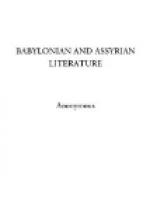Oh, come, dear Zir-ri,[7] tune your lyres and lutes,
And sing of love with chastest, sweetest notes,
Of Accad’s goddess Ishtar, Queen of Love,
And Izdubar, with softest measure move;
Great Samas’[8] son, of him dear Zir-ri sing!
Of him whom goddess Ishtar warmly wooed,
Of him whose breast with virtue was imbued.
He as a giant towered, lofty grown,
As Babil’s[9] great pa-te-si[10] was
he known,
His armed fleet commanded on the seas
And erstwhile travelled on the foreign leas;
His mother Ellat-gula[11] on the throne
From Erech all Kardunia[12] ruled alone.
[Footnote 1: “Samu,” heaven.]
[Footnote 2: “Happy Fields,” celestial gardens, heaven.]
[Footnote 3: “Subartu,” Syria.]
[Footnote 4: “Sari,” plural form of “saros,” a cycle or measurement of time used by the Babylonians, 3,600 years.]
[Footnote 5: From the “Accadian Hymn to Ishtar,” terra-cotta tablet numbered “S, 954,” one of the oldest hymns of a very remote date, deposited in the British Museum by Mr. Smith. It comes from Erech, one of the oldest, if not the oldest, city of Babylonia. We have inserted a portion of it in its most appropriate place in the epic. See translation in “Records of the Past,” vol. v. p. 157.]
[Footnote 6: “Kisar,” the consort or queen of Sar, father of all the gods.]
[Footnote 7: “Zir-ri” (pronounced “zeer-ree"), short form of “Zi-aria,” spirits of the running rivers—naiads or water-nymphs.]
[Footnote 8: “Samas,” the sun-god.]
[Footnote 9: Babil, Babylon; the Accadian name was “Diu-tir,” or “Duran.”]
[Footnote 10: “Pa-te-si,” prince.]
[Footnote 11: “Ellat-gula,” one of the queens or sovereigns of Erech, supposed to have preceded Nammurabi or Nimrod on the throne. We have identified Izdubar herein with Nimrod.]
[Footnote 12: “Kardunia,” the ancient name of Babylonia.]
COLUMN II
THE FALL OF ERECH
O Moon-god,[1] hear my cry! With thy pure light
Oh, take my spirit through that awful night
That hovers o’er the long-forgotten years,
To sing Accadia’s songs and weep her tears!
’Twas thus I prayed, when lo! my spirit rose
On fleecy clouds, enwrapt in soft repose;
And I beheld beneath me nations glide
In swift succession by, in all their pride:
The earth was filled with cities of mankind,
And empires fell beneath a summer wind.
The soil and clay walked forth upon the plains
In forms of life, and every atom gains
A place in man or breathes in animals;
And flesh and blood and bones become the walls
Of palaces and cities, which soon fall
To unknown dust beneath some ancient wall.
All this I saw while guided by the stroke
Of unseen pinions:




